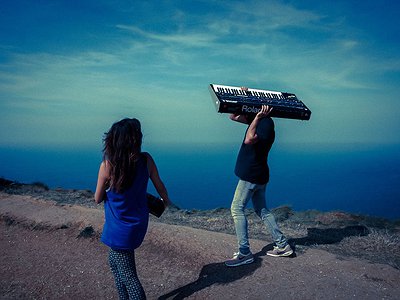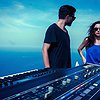Could you describe your creative process on the basis of a piece or album that's particularly dear to you, please? Where did the ideas come from, how were they transformed in your mind, what did you start with and how do you refine these beginnings into the finished work of art?
R&L: An album that’s particularly dear to us is the next one we are preparing, which is our favourite so far. ;) The ideas came in a more fluid way, we search for moods that surround us, the rain might be falling against the roof (we live on the top floor so we hear the rain very loudly) and this sets a vibe. Then I go to the synth and try to create a progression that fills this frame, Liset connects her microphone and sits on the floor searching for a melody …eventually all of this comes together, we add beats, we remove things, we take wrong turns, we go back to the rain … there is no exact method but inspiration and the time to follow it.
There are many descriptions of the ideal state of mind for being creative. What is it like for you? What supports this ideal state of mind and what are distractions? Are there strategies to enter into this state more easily?
L: Being creative is sometimes as simple as ‘you gotta get it done by tomorrow’. You know you have the tools inside you and around you, you just get to it, and it comes together. Distractions are people and emails. Telephones and urgent useless things.
R: it’s not something I actively think about, it’s a state of urgency, an instinctive place. You have to be like an antenna and capture the information that is being transmitted in the air. There are soundscapes around us, waiting for us to perceive them. Not sure I have an official strategy.
How is playing live and writing music in the studio connected? What do you achieve and draw from each experience personally? How do you see the relationship between improvisation and composition in this regard?
You test many things when you’re onstage, you know immediately what works and doesn’t, you go back and make adjustments, edit and improve for the next show. I have gotten really into improvisation onstage because it liberates the electronic genre, it takes it to a riskier place. Like when playing with a band, except you are the sole risk factor and it’s a great way of seeing if you trust yourself, if you have more inside of you than you expected. It’s about plucking the most urgent melody that is appropriate for the moment. When you improvise, you often realize you do.
How do you see the relationship between the 'sound' aspects of music and the 'composition' aspects? How do you work with sound and timbre to meet certain production ideas and in which way can certain sounds already take on compositional qualities?
R: There is no separation between composition and sound. When I was a teenager I was passionate about the musical movement from the 50’s & 60’s called “Musique Concrete”. Composers like Pierre Schaeffer, Pierre Henry in France or Stockhaussen in Germany, they developed a solfege which was not based on written notation but rather on textures and tones. This is the origin which engendered all the sounds we come across in the studio today whilst working with electronic music. That has always been the centre of my work, how to give life to a ‘sound’, how to tell a story with tone.
Our sense of hearing shares intriguing connections to other senses. From your experience, what are some of the most inspiring overlaps between different senses - and what do they tell us about the way our senses work? What happens to sound at its outermost borders?
L&R: Both of us have described music as landscapes, we often see shapes and geometric values when talking about a track, we were very excited to discover we both shared this architectural aspect of ‘hearing’ a composition, as if we enter the space and can see which shapes are missing and present. Our senses are interconnected, colour and emotion, memory and smell, texture and frequency. We do whatever Eno tells us to do.
Mathematics offers us a perfect metaphor, there are equations that lead us to a point which is never attained, unattainable value. The same with music and our perception of sounds which have by definition, logarithmic behaviours. Non-linear. This is the joy of attempting to solve a musical ‘equation/composition’.
Art can be a purpose in its own right, but it can also directly feed back into everyday life, take on a social and political role and lead to more engagement. Can you describe your approach to art and being an artist?
R: My role as an artist is creating and telling stories.
L: It’s important to be deliberate regarding what you create, it is after all the world you invite people to enter when they listen to your music. I would like people to walk out of a song feeling better than when they walked in. Catharsis and motivation, I like spreading the energy of life, the little that I can with the means I have, it’s important for me to feel like I have shared an insight or a beautiful observation. Life doesn’t stop when music is playing (as much as it feels this way sometimes), we are always listening and re-aligning ourselves in reference to what we are being confronted with, be it music or art or politics.
It is remarkable, in a way, that we have arrived in the 21st century with the basic concept of music still intact. Do you have a vision of music, an idea of what music could be beyond its current form?
L: I’d love to share some of my favourite lines by TS Eliot as an answer to this question:
“We shall not cease from exploration, and the end of all our exploring will be to arrive where we started and know the place for the first time”
R: Whatever the technological evolution may be, music will always be a way of organizing and manipulating vibrations in order to somehow approach God. Which is by definition a desperate mission but perhaps the most human of ambitions.



